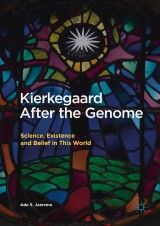Details

Kierkegaard After the Genome
Science, Existence and Belief in This World|
CHF 77.00 |
|
| Verlag: | Palgrave Macmillan |
| Format: | |
| Veröffentl.: | 20.08.2017 |
| ISBN/EAN: | 9783319579818 |
| Sprache: | englisch |
Dieses eBook enthält ein Wasserzeichen.
Beschreibungen
<div><p>This book brings Søren Kierkegaard’s nineteenth-century existentialist project into our contemporary age, applying his understanding of “freedom” and “despair” to science and science studies, queer, decolonial and critical race theory, and disability studies. The book draws out the materialist dimensions of belief, examining the existential dynamics of phenomena like placebos, epigenetics, pedagogy, and scientific inquiry itself. Each chapter dramatizes the ways in which abstractions like “race” or “genes” and even “belief” are sites of contested practices with pressing political significance. Focusing on the existential dangers posed by neo-liberal and finance capitalist systems, the book brings to life the resources for resistance found within science studies and critical approaches to race, secularity, and disability. Throughout the book, Kierkegaard becomes an ally with ecological and developmental evolutionary theorists, as well as with science studies, critical race, and crip theorists who foreground the relational and impassioned nature of existence. </p></div>
Chapter 1 Sin, Secularity and Belief in This World Chapter 2 The Existential Stakes of Epigenetics Chapter 3 Placebos and the Materiality of Belief Chapter 4 Design, Disability and Play: Becoming in the Classroom Chapter 5 Is Science Post-Secular? Cures, Despair and Spiritual Practice
Ada S. Jaarsma is associate professor of philosophy at Mount Royal University. Her articles have appeared in <i>Gender and Education</i>, <i>Studies in Philosophy and Education</i>, <i>European Legacy</i>, <i>Constellations</i>, <i>Journal for Cultural and Religious Theory,</i> and <i>Hypatia.</i>
This book brings Søren Kierkegaard’s nineteenth-century existentialist project into our contemporary age, applying his understanding of “freedom” and “despair” to science and science studies, queer, decolonial and critical race theory, and disability studies. The book draws out the materialist dimensions of belief, examining the existential dynamics of phenomena like placebos, epigenetics, pedagogy, and scientific inquiry itself. Each chapter dramatizes the ways in which abstractions like “race” or “genes” and even “belief” are sites of contested practices with pressing political significance. Focusing on the existential dangers posed by neo-liberal and finance capitalist systems, the book brings to life the resources for resistance found within science studies and critical approaches to race, secularity, and disability. Throughout the book, Kierkegaard becomes an ally with ecological and developmental evolutionary theorists, as well as with science studies, critical race, and crip theorists who foreground the relational and impassioned nature of existence. <p></p>
<p>Presents the surprising existential insights of science studies scholars</p><p>Discusses the 21st century relevance of ?Søren Kierkegaard</p><p>Poses exstentialism as a way to think about scientific controversies</p><p>Includes supplementary material: sn.pub/extras</p><p>Includes supplementary material: sn.pub/extras</p>
“Jaarsma has written an extraordinary book that completely rejuvenates Kierkegaard’s thought for the twenty-first century. What happens to belief, she asks, when it becomes synonymous with a placebo effect? Or to religious belief, when it becomes belief in this world? What if the Human Genome project is a Neo-Darwinist theodicy, where both the design and malevolence of the world find their ratification, not in divine omniscience, but in genomic scripts? What if Kierkegaard were a process philosopher like Whitehead, or a sociologist of science like Latour, or a race theorist like Fanon, or an existential theorist in disability studies? Jaarsma poses these questions—and many others—with the dexterity of a rigorous philosopher and astute cultural observer, and she writes in a style that is at once personal and erudite. Kierkegaard after the Genome is an essential work that will both revitalize Kierkegaard studies and has the potential to transform its readers’ relations to their lives and to their existential worlds.” (Daniel W. Smith, Professor of Philosophy, Purdue University, USA) <p>“In this startlingly original book, Ada Jaarsma shows why science studies needs to get existential, and why feminist, queer, decolonial, and disability theorists need to engage with science studies (and vice versa). While critiquing secularizing narratives of development, Jaarsma draws on post-genomic science studies to develop a non-teleological, relational, and materialist approach that attends to the stories told by bodies-in-becoming as well as those captured by indifference or despair. Her distinctively anti-individualist Kierkegaard is an ally in resisting the deadening forces of colonialism and capitalism, and seeking out spiritually lively modes of existence that foster divergent perspectives and amplify possibilities for becoming.” (Rachel Jones, Associate Professor in Philosophy, George Mason University, USA)</p>
Diese Produkte könnten Sie auch interessieren:

Karl Schuhmann, Selected papers on phenomenology

von: Karl Schuhmann, Cees Leijenhorst, Piet Steenbakkers

CHF 177.00















